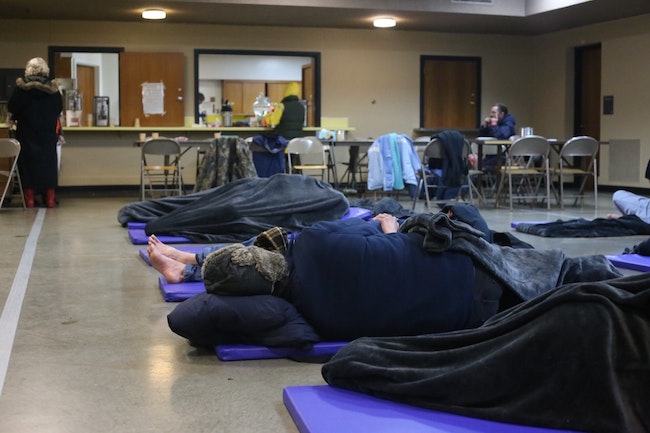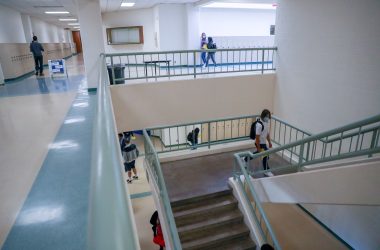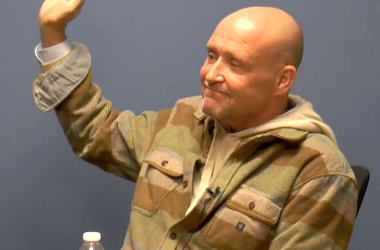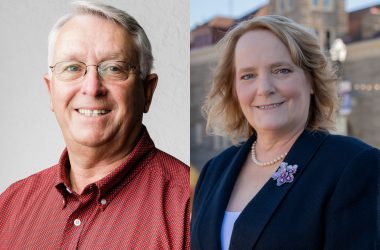 People sleep on mats at a warming shelter at First Presbyterian Church during a cold snap in January. (Troy Brynelson/Salem Reporter)
People sleep on mats at a warming shelter at First Presbyterian Church during a cold snap in January. (Troy Brynelson/Salem Reporter)
Momentum to build more shelters in Salem could be in for a powerful push.
Senate President Peter Courtney said Thursday he wants the state to pitch in between $3 million and $4 million to add shelters in the capital city. He said he’d look to tap the state general fund to help pay for construction and operational costs.
Courtney said he plans to take the cause to the upcoming legislative session, which starts Feb. 3.
“I’m going to guarantee you I’m going hard in February,” Courtney said. “I’m going to go hard and see if, in terms of funding, in terms of facilities, to see if we can help.”
The Salem Democrat has since 2003 held a powerful post at the capital: leader of the Senate. He’s plucked millions of state dollars for local causes as recently as 2017, when he arranged $12 million in state lottery bonds for rebuilding the Salem YMCA.
The kinds of shelters Courtney has in mind would be open often and with very few restrictions on who could use them. The news arrives after the city of Salem’s plan to help pay for churches to expand warming shelters went into flux.
Courtney said he was partly motivated by the city of Salem’s recent ban on public camping. The ban went into effect Monday. Two days later, city staff and police broke up a camp of nearly 70 people staked to boulevards around a downtown social services provider.
Courtney said he understood the intent was to make public areas safer. He said he saw the camp grow in recent months, driving by on his way to work.
“Whenever I come in from north Salem, I go right by (the camp) and see what’s going on,” he said. “It’s clear we are woefully in need. Woefully.”
He added that homelessness, shelter, affordable housing are complex civic issues knotted together.
“Many people think this is simplistic and it’s not at all,” he said, adding that he expects more shelters won’t convince all residents to come indoors. “It’s complicated.”
But he said more help is needed. He said it’s clear the state now needs to get involved.
“I do know that we don’t have enough warming shelters. We don’t have enough shelters. We don’t have enough housing. We’re very much in catch-up mode,” Courtney said. “I think Salem’s done well in a lot of ways, but she’s very much in catch-up mode.”
Salem City Council recently gave $213,000 to help two church-run warming shelters open every night from January through March, instead of just when temperatures hit freezing. That would have brought about 140 beds online every night.
That plan took a hit this week, however, when one of the churches decided they couldn’t expand. Leaders at the church said there was a miscommunication, first reported by the Statesman Journal.
“We’re thrilled the city is looking at ways to expand ways to house our homeless population. With all our other partnerships, we just couldn’t swing it,” Rob Thrasher, a minister at Salem First Presbyterian Church, told Salem Reporter.
Meanwhile, the state recently published a report that spotlighted Salem and Eugene as cities that need to build “navigation centers,” open around-the-clock to anyone to help people with housing and health care, among other concerns.
Mayor Chuck Bennett said the state report “plays a huge role” in city plans because it showed the state would help. Urban Development Director Kristin Retherford said the city would start exploring such centers.
There are an estimated 330 shelter beds offered in Salem, but the patchwork of organizations who run them have different restrictions. Some offer beds only to men, or don’t allow pets, or have high sobriety standards homeless residents can’t meet.
Have a tip? Contact reporter Troy Brynelson at 503-575-9930, [email protected] or @TroyWB.
Related Coverage:
Residents of downtown homeless camp reflect, consider where to go after city clean-up (Dec. 18, 2019)
Salem needs ‘navigation center’ for homeless, state-backed report said (Dec. 16, 2019)









